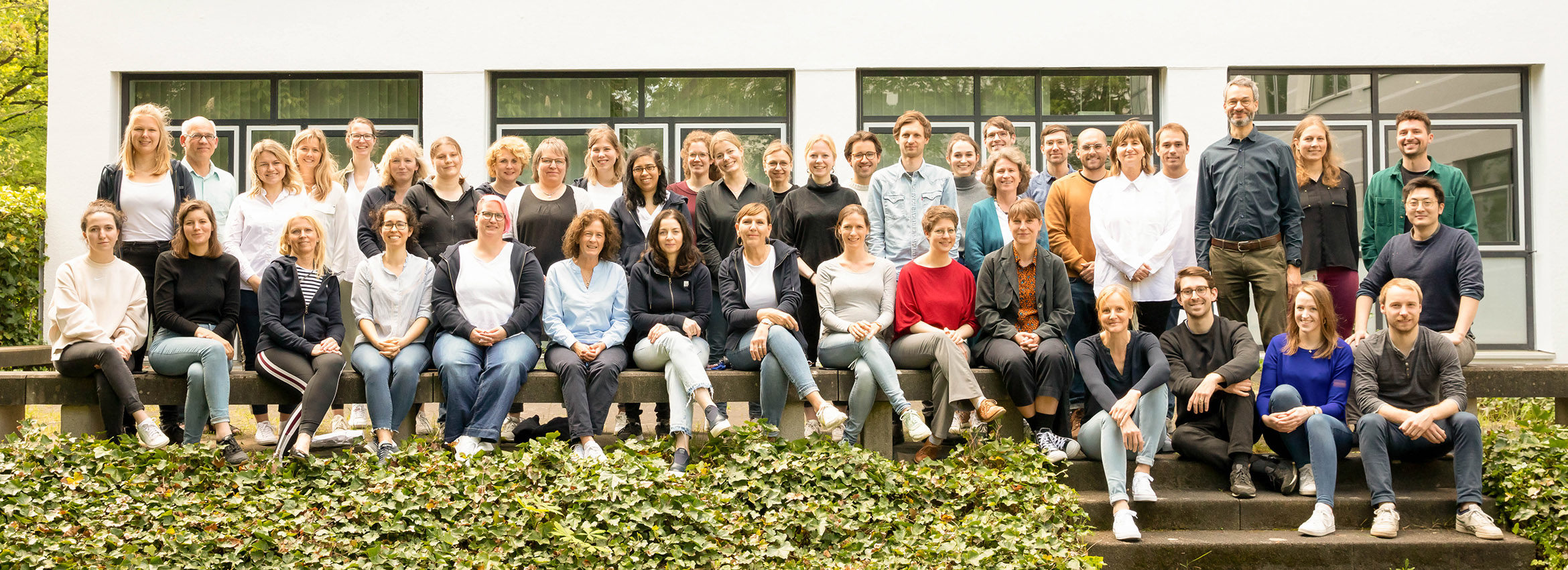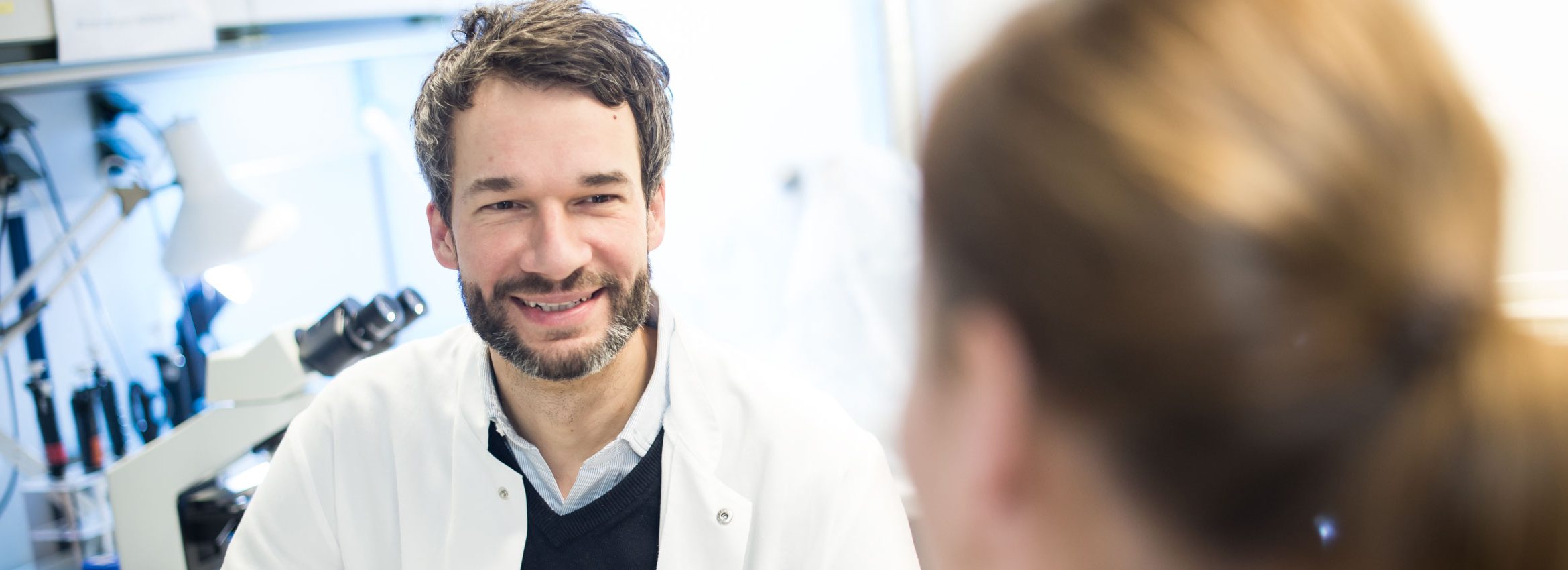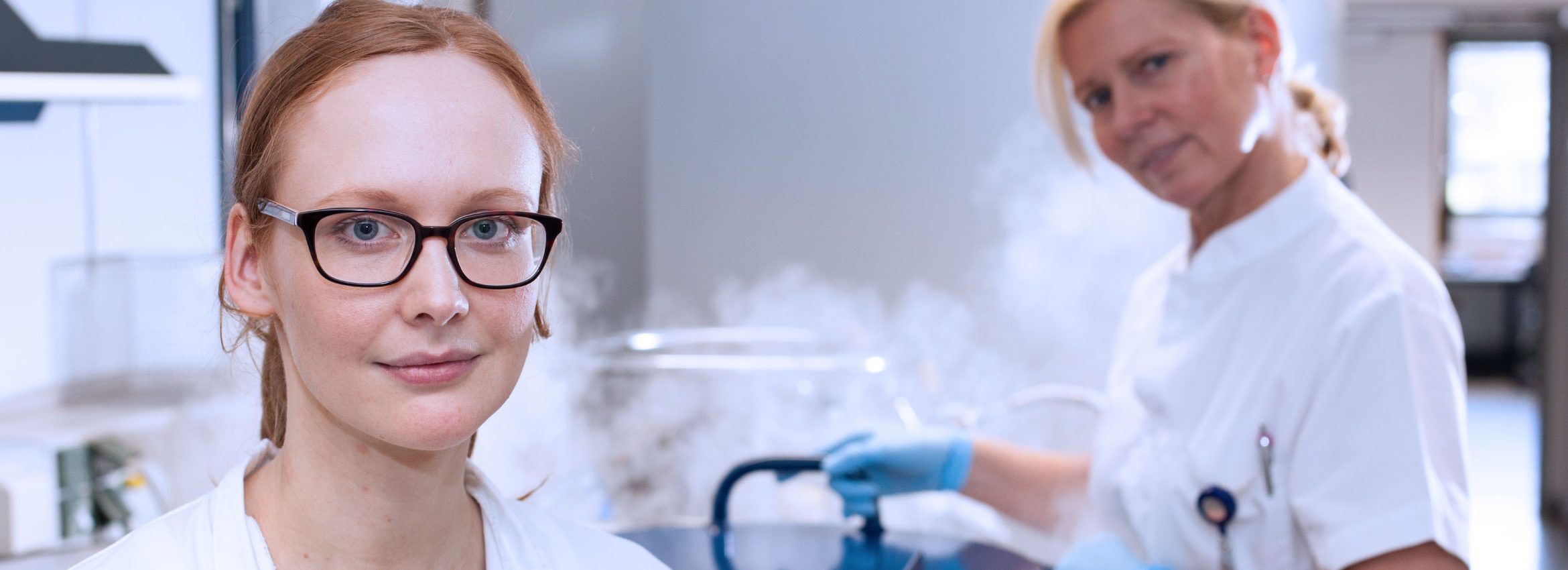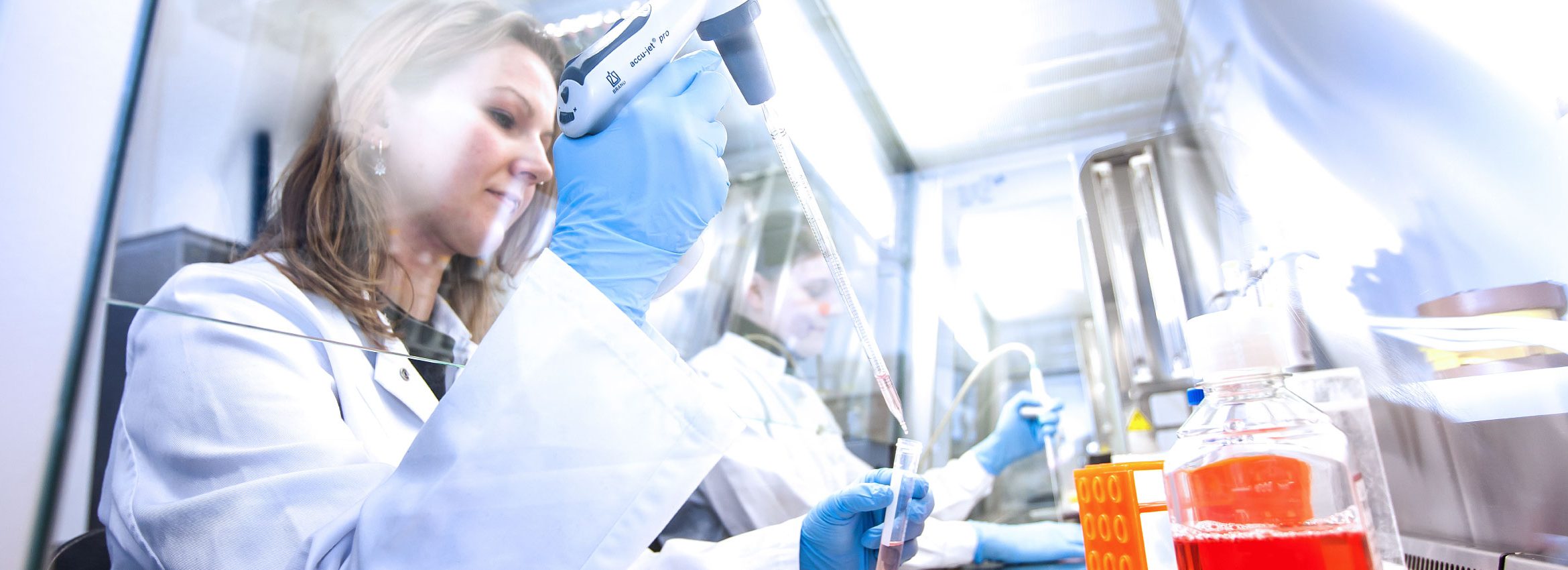„We seek to better understand the development and progression of neuroimmunological and neuroinfectious diseases with particular emphasis on multiple sclerosis to translate molecular findings into drug treatment and improve clinical care. In order to achieve this goal, we systematically study immunology, neurobiology and patient care using a wide methodological spectrum.“
Institute
The Institute of Neuroimmunology and Multiple Sclerosis (INIMS) at the University Medical Centre Hamburg-Eppendorf was founded 2006 based on an initiative of the Gemeinnützige Hertie-Stiftung which intended to create a translational research institute for multiple sclerosis research. Committed to the mission to better understand the aetiology and pathogenesis of multiple sclerosis and other neuroimmunological diseases and to translate this knowledge into efficacious treatments. Besides cellular and molecular research, the INIMS also sets high standards in providing patient care.To achieve these goals, basic research is interlocked with clinical activities ensuring access to patients as well as for conducting clinical studies. The INIMS consists of two operational units: It integrates a (i) basic science institute located at the Centre for Molecular Neurobiology Hamburg (ZMNH) with a (ii) clinical research unit located at the dedicated day hospital for patients with multiple sclerosis and other neuroimmunological diseases (outpatient clinic) affiliated to the Department of Neurology. The INIMS basic science institute is equipped with state-of-the art cellular and molecular biology laboratories as well as in vivo facilities focussing on immunology and neurobiology research. The INIMS closely interacts with the Department of Neurology to assure continuity in inpatient and outpatient care of neuroimmunological patients (over 10,000 patients in database), biomaterial collection (multiple sclerosis biobanking with samples of almost 4,000 individuals) and continuous medical education as well as teaching of students. Moreover, the Fraunhofer Institute IME SP operates a Biomarker and Discovery Biology platform located at the INIMS addressing biomarker development in multiple sclerosis and their treatment trials and collaborating with the INIMS in several projects.
The main scientific goals of the INIMS are:
- Translational research – to transform biology into effective therapeutic agents for neuroimmunological diseases
- to study the aetiology and pathogenesis of multiple sclerosis and other neuroimmunological and neuroinfectious diseases
- to investigate the immune system and the central nervous system and their interactions to understand mechanisms of immune cell dysregulation, neurodegeneration and neuroprotection
- to develop new drugs and behavioural interventions for multiple sclerosis patients and other neuroimmunological and neuroinfectious diseases and to test them in respective treatment trials

Open positions
If you are interested in joining the INIMS, please send an email to Manuel Friese, and include your CV and a brief statement of why you are interested in our work. We look forward to hearing from you!
Send email
Disclosure of Industry Relationships
We believe that public accountability is important for patients in order to decide which factors might have potentially influenced their medical care. Besides the science of medicine, patients need to be empowered to understand decisions and participate as equal partners in every discussion that affects their healthcare. Therefore, we feel that disclosing industry relationships is our duty to be accountable and socially responsible to those we treat in medicine.| Personal honoraria received in 2014: | |
| Friese | EUR 0 |
| Gold | EUR 0 |
| Heesen | EUR 2,000 (Merck Serono, Novartis) |
| Contributions from industry partners to research projects in 2014: | |
| Alpinia Laudanum Institute of Phytopharmaceutical Sciences AG |
EUR 86,000 |
| Bayer Vital | EUR 1,000 |
| Biogen Idec | EUR 103,146 |
| Genzyme GmbH | EUR 12,000 |
| Merck Serono GmbH | EUR 15,000 |
| Novartis Pharma GmbH | EUR 67,000 |
| TEVA GmbH | EUR 4,968 |
| Personal honoraria received in 2015: | |
| Friese | EUR 865 (Novartis) |
| Gold | EUR 0 |
| Heesen | EUR 4,477 (Merck Serono) |
| Contributions from industry partners to research projects in 2015: | |
| Alpinia Laudanum Institute of Phytopharmaceutical Sciences AG |
EUR 18,235 |
| Biogen Idec | EUR 112,370 |
| Genzyme GmbH | EUR 51,240 |
| Merck Serono GmbH | EUR 14,573 |
| Novartis Pharma GmbH | EUR 28,598 |
| TEVA GmbH | EUR 14,041 |
| Personal honoraria received in 2016: | |
| Friese | EUR 0 |
| Gold | EUR 0 |
| Heesen | EUR 2,563 (Novartis, Teva) |
| Stellmann | EUR 2,850 (Biogen, Genzyme) |
| Contributions from industry partners to research projects in 2016: | |
| Alpinia Laudanum Institute of Phytopharmaceutical Sciences AG |
EUR 22,000 |
| Biogen Idec | EUR 51,500 |
| Novartis Pharma GmbH | EUR 71,000 |
| Genzyme GmbH | EUR 31,500 |
| Roche | EUR 237,500 |
| Personal honoraria received in 2017: | |
| Friese | EUR 0 |
| Gold | EUR 0 |
| Heesen | EUR 0 |
| Stellmann | EUR 0 |
| Contributions from industry partners to research projects in 2017: | |
| Biogen | EUR 1,500 |
| Genzyme | EUR 290,000 |
| Merck Serono | EUR 2,000 |
| Novartis | EUR 1,000 |
| Roche | EUR 121,500 |
| Personal honoraria received in 2018: | |
| Friese | EUR 2,250 (Roche, Novartis) |
| Gold | EUR 4,400 (Almirall, Mylan) |
| Heesen | EUR 1,000 (Merck) |
| Stellmann | EUR 1,400 (Biogen, FOMF) |
| Contributions from industry partners to research projects in 2018: | |
| Alpinia | EUR 500 |
| Biogen Idec | EUR 4,024 |
| Genzyme | EUR 20,973 |
| Novartis | EUR 8,732 |
| Roche | EUR 69,363 |
| Teva | EUR 4,064 |
| Personal honoraria received in 2019: | |
| Friese | EUR 3,480 (Merck Serono GmbH, Biogen GmbH) |
| Gold | EUR 1,440 (Celgene) |
| Heesen | EUR 3,000 (Celgene) |
| Stellmann | EUR 1,600 (Alexion) |
| Contributions from industry partners to research projects in 2019: | |
| Alpinia | EUR 590 |
| Biogen Idec | EUR 10,200 |
| Genzyme | EUR 96,843 |
| Novartis | EUR 12,555 |
| Roche | EUR 49,293 |
| Teva | EUR 16,005 |
| Personal honoraria received in 2020: | |
| Friese | EUR 9,388 (Merck Serono GmbH) |
| Gold | EUR 0 |
| Heesen | EUR 1,000 (Merck Serono GmbH) |
| Contributions from industry partners to research projects in 2020: | |
| Biogen Idec | EUR 9,322 |
| Genzyme | EUR 54,565 |
| Merck Serono | EUR 39,069 |
| Novartis | EUR 5,336 |
| Roche | EUR 73,586 |
| Teva | EUR 12,129 |
| Personal honoraria received in 2021: | |
| Friese | EUR 6,150 (Merck Serono, Lundbeck, Roche) |
| Gold | EUR 0 |
| Heesen | EUR 2,780 (Uni Dresden, RG Ärzte-Fortbildung, Roche podcast, Diaplan, Merck Serono GmbH) |
| Contributions from industry partners to research projects in 2021: | |
| Genzyme | EUR 6,577 |
| Merck Serono | EUR 50,431 |
| Roche | EUR 34,826 |
| Personal honoraria received in 2022: | |
| Friese |
EUR 1,000 (Gemeinnützige Hertie Stiftung) EUR 2,400 (Lundbeck) EUR 1,000 (Merck KGaA) |
| Gold | EUR 0 |
| Heesen | EUR 1,000 (Roche Digital Board) |
| Contributions from industry partners to research projects in 2022: | |
| Genzyme | EUR 629 |
| Merck Serono | EUR 3,638 |
| Roche | EUR 10,505 |
| Immunic AG | EUR 146 |
| Personal honoraria received in 2023: | |
| Friese |
EUR 1,000 (Gemeinnützige Hertie Stiftung) EUR 1,610 (Alexion) EUR 400 (SUDO Biosciences Ltd.) EUR 1,500 (MerckSerono GmbH) EUR 400 (Kyverna) |
| Heesen |
EUR 1,500 (Novartis) EUR 1,000 (Roche) |
| Rosenkranz | EUR 0 |
| Contributions from industry partners to research projects in 2023: | |
| Genzyme | EUR 13,176 |
| Immunic AG | EUR 263 |
| Novartis | EUR 1,350 |







